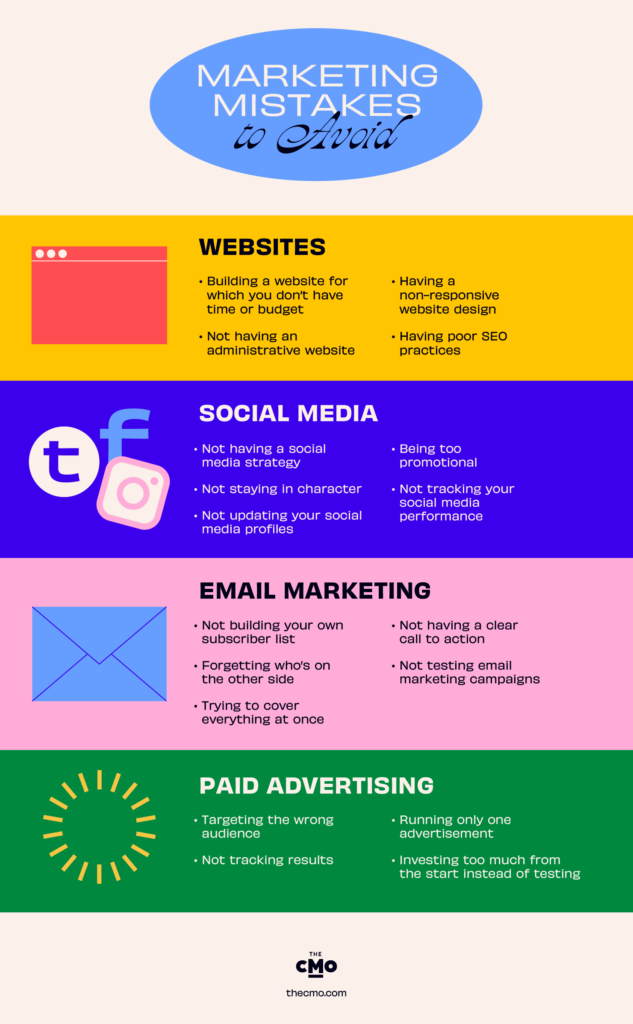47% of all small businesses say they rely on marketing as their main strategy for growth, but knowing which marketing techniques to pick and how to use them is no easy feat.
As a small business owner, you need to make sure you’re using your limited resources as effectively and efficiently as possible. That’s why we’ve put together these 10 tips for small business marketing which will help you grow your business and avoid costly mistakes.
I have worked in marketing roles for small businesses for over 10 years, and I’m also the owner of an ecommerce business. During that time I’ve made plenty of marketing mistakes, but I have also learnt that being a small business can actually work to your advantage, enabling you to trial new marketing strategies far more quickly than your competitors.
So, here are my top 10 tips for your small business marketing strategy:

Develop a Detailed Marketing Plan
Businesses with marketing plans consistently achieve better results than those without them (according to a survey they’re 331 percent more likely to report success!). A well thought through marketing plan will help you identify the most appropriate marketing channels for your business, keep on top of your marketing spend and track the success of your campaigns.
An effective small business marketing plan will usually include:
- Your buyer persona / target audience
- The types of content that will be most relevant to your target market
- The most appropriate marketing channels to reach your audience
- A timeline for your marketing ideas and activities
Publish Consistent, High Quality Content
Content marketing refers to any content your business creates to entertain or inform your audience, and it’s one of the most effective ways to build brand awareness and customer relationships. Content doesn’t necessarily have to mean articles or blogs—it also includes podcasts, webinars, books, videos, social media posts and much more. The main thing is to identify in your marketing plan the types of content that will be most useful for your audience and to produce it consistently.
Content marketing can be particularly useful for services businesses which need to demonstrate expertise. Articles are one of the main forms of content we produce at the law firms I have worked at as they’re a great way to show industry knowledge and expertise.
Make sure you analyze how your subscribers interact with the content you produce, so you can keep adapting your content to improve readership and click through rates. For example, I found that some of the blogs on my ecommerce site were getting lots of traffic from Pinterest—after a bit of digging I realized that people were pinning the infographics within those articles, so I make sure to include a lot more infographics in all my articles now.
Create Conversations With Social Media Marketing
I see lots of small businesses putting out posts on social media with little to no engagement. Often, it’s because these businesses have forgotten that social media marketing is a conversation. It’s a two-way thing. You can’t just publish social media posts and then not engage or respond to your followers.
If you’re a small business, you might not get a lot of comments yet on social media platforms, but there are still plenty of ways to start a conversation. You could choose a recent event or development in your industry, give your view on it and ask others for their comments. Or could also simply pose a question, for example if you’re a beauty brand, you could ask “What piece of makeup could you not live without?” Make sure you’re also commenting on other people’s posts so you can start conversations that way.
If you respond to all your comments and questions quickly, you’ll find that you are able to grow your social media following and build great engagement with your target audience.
Reach More People With Nano & Micro-Influencer Marketing
If you think influencers are just for big household brands, think again. Nano-influencers (people with 1,000–10,000 followers) and micro-influencers (10,000–100,000 followers) often have some of the most engaged audiences and often won’t charge you a fortune. In some cases, nano-influencers will promote your product purely in exchange for the product or a small commission.
Influencers can benefit almost all brands but they work particularly well in industries where consumers look to experts for inspiration. For example, many people will look to athletes and personal trainers for inspiration when it comes to buying workout clothes, or makeup artists for beauty products.
To find micro influencers in your niche, have a look on social media and use relevant search terms and hashtags to find the right accounts for your business. Don’t just focus on the size of an influencer’s audience but look at how engaged their following is—the number of comments they get on each post is a good indicator of this. If you want to save time, you can use social media management tools like Hootsuite or influencer platforms like Heepsy to quickly identify the right influencers for you.
Boost Engagement With Video Content Marketing
Companies that use video content marketing get on average 66% more qualified leads per year than companies that don’t, so there is no denying it’s a powerful tool.
But it’s not just for big businesses with large marketing budgets. You can start your own YouTube channel with your phone and a simple tripod and ring light set up. Easier still, you can create recordings in real time with social media channels such as Facebook Live, Instagram Live and TikTok—these enable you to engage with your audience in an authentic way, helping to build trust.
Video is particularly useful for communicating complex ideas or educating potential customers about your products or services.
Feature Reviews in Your Digital Marketing
60% of shoppers say that business reviews are critical to whether they decide to buy from a business, and they’re particularly important for small businesses which don’t necessarily have a big profile yet.
It’s important to start encouraging reviews as quickly as possible. You could do this by offering buyers a discount on their next purchase when they leave a review on your website, or you could encourage user generated content on social media—this can work particularly well for beauty brands.
Once you start collecting reviews, there are lots of different ways to include them in your digital marketing. You could:
- Feature them on your website, preferably close to a call to action on a booking form or checkout page to boost conversion.
- Share them on social media (even better, you could ask your customers to share video reviews to boost customer trust).
- Include them in promotional emails to encourage potential buyers to purchase.
- If you’re a local business, create a Google My Business profile and ask customers to leave reviews there to boost your search engine optimization (SEO).
Build Relationships and Retain Customers With Email Marketing
Email marketing offers an amazing opportunity for small businesses—99% of email users check their email every day so it has incredible reach. There are lots of different ways you can use an email marketing strategy to build customer relationships, you can:
- Share your industry expertise with a weekly or monthly email newsletter.
- Boost sales with promotional emails which give subscribers access to special deals or new product launches.
- Use automated emails like abandoned cart emails to increase conversions.
The great thing for small businesses and startups is that with the right email marketing software you can reach a wide audience with minimal time and effort. For example, I use ActiveCampaign in my own business to create email templates and automations so that once I’ve created a promotional email flow, I can reuse it and send it to all the relevant subscribers. I also have an automated weekly newsletter featuring evergreen content which new subscribers are automatically added to when they join my email list.
Partner With Other Local Businesses
If you’re a local business, partnering with other businesses in your area offering a complimentary service is one of the quickest ways to raise your business profile. Building a network is vital and it’s easier than you think. You can often find local business events on Meetup or Facebook, or you can start to build a network simply by reaching out to other businesses on social media.
This is something I did regularly when I had a local events business and it helped generate a lot of new business leads. We specialized in event photography and so we had partnerships with event planners and DJs allowing us to offer customers a package deal. It was beneficial for our customer base and it also meant that each of the suppliers gained exposure to a new audience. We would also run marketing events together like styled shoots and wedding fairs which we could use as part of our marketing strategy.
Use Referral Marketing To Generate Word-of-Mouth
Referral marketing is essential for building trust, particularly when consumers are 4 times more likely to purchase a product if referred by a friend. If you’re not using referral marketing, you’re missing out on sales.
There are lots of different ways to incentivise referrals. You could offer customers a voucher when they recommend a friend to use your service (companies like Just Eat do this really well) or you could even offer free products or a discount on future purchases. I encourage customers of my online shop to refer their friends to my website by offering a specific referral discount code.
Optimize for Search Engines (SEO)
SEO is a really effective tool for small businesses because it doesn’t have to cost you anything. SEO is a constantly developing area, but in essence it involves making sure that your website features high quality content, good internal and external linking, and is structured and optimized according to Google guidelines.
When you optimize your website for SEO you boost your chances of appearing near the top of SERPs (search engine results pages). The top three Google search results get over 50% of all clicks so being at the top of Google can translate into a lot of sales.
Small Business Marketing Mistakes To Avoid
Small business marketing doesn’t have to be complicated, if you stay on your guard for these common pitfalls then you’ll be well on your way.

Not Optimizing Your Website
Don’t let all your marketing efforts go to waste with a poor performing website. If you’re not particularly tech savvy or you don’t have a website developer, you can still create a really professional website using drag and drop website builders like Wix or Squarespace. An optimized website should:
- Be easy to navigate for visitors
- Be mobile friendly for visitors viewing the site on their phones or tablets (mobile devices generate 58% of all global website traffic)
- Have easy to find contact details
- Not have broken links and 404 pages
Not Tracking Marketing Metrics
Without tracking and analyzing marketing metrics you have no idea what marketing tactics are working, whether you’re getting a good return on investment and what you need to change.
Free tools like Google Analytics will give you invaluable data on the number of visitors to your website and their behavior on your site, while many digital marketing tools like DashThis allow you to create custom dashboards and reports so you can keep track of all your marketing KPIs.
It’s particularly important to track your marketing spend and ROI when running marketing campaigns. I once spent a lot of money on LinkedIn ads for my events business after I failed to keep an eye on the cost per click on each ad.
Metrics will help you understand:
- Where your business leads come from
- What attracts customers to your products or services
- How potential customers interact with your brand
- How successful particular campaigns are, for example the open rate of a specific email campaign
Marketing To The Wrong Audience
Marketing to the wrong audience is easily done and it’s something I’ve been guilty of in the past. According to Hubspot, Less than half of marketers know important information about their audience demographics like their shopping habits, interests and hobbies and the kind of content they consume.
To avoid falling into this pitfall, get really clear on your ideal customer and where they spend their time. Then use your marketing metrics to validate your assumptions. It’s important to be adaptable, particularly when launching a new product or service.
I once launched a room spray for men and I ran Facebook ads aimed at men between the ages of 18 - 30. I got a lot of impressions but very few sales. It wasn't until I did some analysis of the sales we had received that I realized most of our customers were women who were buying the sprays for the men in their lives. Had I paid closer attention to my marketing metrics, I probably could have come to the realization sooner and saved myself some money.
Not Using The Right Tools
As we’ve discussed, marketing tools can be a lifesaver for a small business, helping you to create sophisticated marketing campaigns on a small budget. There are plenty of marketing software for small businesses for you to test out, but be sure not to get lost in the weeds. A lot of business owners (myself included) have shiny object syndrome when it comes to software—in other words, you love any excuse to try new apps. This can be costly and waste valuable time.
To avoid this, get really clear on what you want to achieve with a particular tool and then make sure you find an option suitable for your business size. For example if you’re a small start up and you want to set up an email software system, you would be best off starting with an easy to use, cost effective solution like Mailchimp rather than jumping into a more complex (and more expensive) option like Salesforce.
Trying To Do Too Many Things At Once
When coming up with a marketing strategy for your business, it can be really tempting to try lots of different marketing channels and techniques, but when you’re a small business with limited budget and resources, this can leave you spread too thin.
I’ve done this myself—when starting my events business, I began by trying to post on Facebook, Instagram, Linkedin, Twitter and Pinterest—the result was I ended up posting on all of them sporadically and never often enough to get some real traction. Once I finally decided to focus
solely on Facebook and Instagram, I was able to post more often and I started to see my following increase much more quickly.
Be selective about what marketing channels and tactics you choose and use your marketing metrics to assess every few months if it’s worth dropping or trialing another marketing technique.
Time To Get Started
I have learnt that being a small business can actually be a huge advantage when it comes to marketing as I have been able to innovate far quicker than my larger competitors.
With the right tools and techniques you can really punch above your weight, so head over to our round up of the best small business marketing software to get started.
If you’re looking for more marketing tips for your business, be sure to subscribe to the CMO newsletter so you don't miss a beat.



